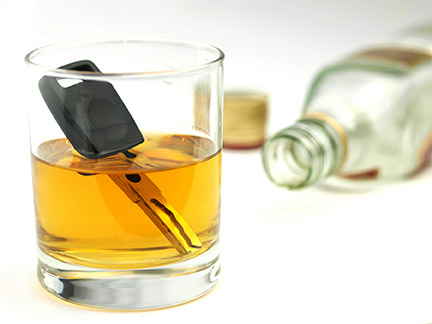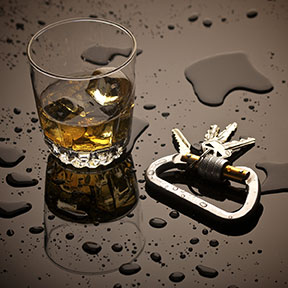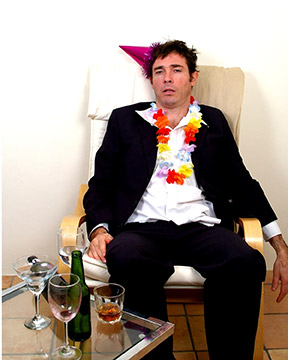DUI Driver's License Suspension or Revocation Attorneys | Implied Consent Laws | Under 21 Drunk Driving License Suspension Lawyers | SR - 22 High Risk Auto Insurance
DUI / DWI Driver's License Suspension
If you have been arrested under the suspicion of drunk driving, one thing you can be sure of is that your ability to operate a motor vehicle will be affected. DUI / DWI laws and penalties vary throughout the country but one constant is that an impaired driving arrest will result in some action against your driver's license. The amount of time for which you will lose your license to operate a motor vehicle varies from state to state in addition to a number of other variables. While it is very difficult to keep your driver's license following a drunk driving arrest, it is not impossible. A skilled DUI / DWI attorney in your state will be able to listen to the facts of your case, and using his knowledge of DUI laws, procedures, and technology, provide for you a reasonable idea of what your chances of successfully fighting your DUI charge are under your specific circumstances. When describing the events that led up to your DUI arrest, it is important to be as detailed as possible. While certain things may seem insignificant to you, an experienced DUI lawyer knows that the potential to beat a DUI lies in the details.
 |
Factors that can impact the duration of drunk driving license suspension:
|
The Driver's License Suspension Process and Your DUI Arrest
You have been placed under arrest for DUI by a police officer and have been transported back for processing. You have either submitted to a chemical test and had a BAC of .08% or higher or you have refused to submit to chemical testing. Following either of these actions, the police officer will probably take physical possession of your drivers license and issue to you in its place a temporary driving permit (usually valid for between 30 and 45 days - an expert DUI lawyer will know the length in your state). The officer will notify the Department in charge of driver's licensing in your state with notice of your DUI violation and the details of the arrest. Without any further action from you, the Department of Motor Vehicles will either suspend or revoke your driver's license upon expiration of your temporary permit. If you or your DWI / DUI lawyer file a timely request for an administrative hearing regarding your license suspension, you generally retain the right to drive until the administrator has made a determination. Contact either your local DMV office to learn more about the DUI / DWI license suspension process or a knowledgeable DUI lawyer who can try to help you keep your driver's license.
DUI / DWI Implied Consent Laws - What Happens if I Refuse to Submit to Chemical Testing
In DUI law, there is a concept known as implied consent. Basically, what implied consent means is that just by driving within that state you consent to chemical analysis of your bodily fluids to determine BAC if a police officer has probable cause to believe you were driving while under the influence of alcohol or drugs. If you have ever possessed a driver's license you have consented to this. You probably didn't notice it at the time, but it was discussed in one of the documents you signed when you first got your driver's license.
When you are arrested for a DUI and brought back to the police station for processing, the officer will begin procedures to determine your Blood Alcohol Content (BAC). Most often this means that the officer will request you submit to analysis of your breath. Note that you often have the right to request a blood sample instead of a breath test - if you believe that a blood test is in your best interest, it does not hurt to ask. At this point, you have a choice to make: do you submit to chemical testing and abide by the implied consent law or do you refuse to submit to chemical testing and violate the implied consent law.
In every state, refusal to submit to chemical testing carries with it automatic penalties on your driver's license that are considerably more severe than the driver's license suspension penalties if you do submit to testing and blow a .08 or higher. By violating the implied consent laws and refusing to comply, you have automatically put your driving privileges in jeopardy.
One of the most common issues surrounding DUI license suspension is the question of whether it is better to submit to chemical testing or refuse to submit to chemical testing. Some people believe that if they refuse to submit to a breathalyzer or other chemical test for intoxication that they can't be charged with a DUI because it is impossible to prove that they were over the legal limit of .08% BAC. This is not the case. You can still be charged with DUI without taking a BAC test if the prosecutor believes he has enough evidence to show that you were operating a motor vehicle under the influence of drugs or alcohol.
Revocation vs. Suspension - What's The Difference Between a DWI / DUI Driver's License Suspension and a DUI / DWI Driver's License Revocation?
Different states may use revocation and suspension interchangeably to signify that a driver does not currently have the privilege to operate a motor vehicle. In many other states, however, the terms suspension and revocation are both used in the context of DUI driver's license suspension to mean different things:
- Suspension: Less harsh. At the end of a driver's license suspension your driving privileges will be restored automatically. Generally suspension of a driver's license is the typical penalty following a first DUI where there were no aggravating factors.
- Revocation: More harsh. Following a driver's license revocation, driving privileges do not automatically restore. In order to obtain a driver's license following revocation a DUI offender will have to apply with the proper licensing administration (DMV, RMV, DPS, etc). Driver's License revocation is generally the punishment where this is a second or subsequent DUI or where aggravating factors are present.
You can see what a typical penalty may be by choosing your state from the DUI Penalties page. Then, call a DUI lawyer in your state to discuss the particulars of your drunk driving arrest.
|
|
Getting a DUI, DWI, OWI, or any other drunk driving charge will not only cause social embarrassment and harsh fines and penalties. It will also restrict your ability to travel independently. You will have to rely on friends for rides and taking the bus to get around. One morning, when you're waiting at the bus stop you'll really regret your decision to drive home from the bar that night you got the DUI. Hiring an experienced DUI attorney who will fight for the most reasonable license suspension possible and keep you independently mobile. |
Hardship Permits - How a DUI Lawyer Can Help You Drive During Your Drunk Driving License Suspension
Following a drunk driving license suspension, you may be eligible to apply for a permit that allows you to drive under certain circumstances. Restricted driving permits, called hardship licenses by some states, are exactly what they sound like: they give you the ability to drive during your DUI license suspension but with specific rules such as: allowing you only to drive to and from work, school, DUI class, alcohol education and / or rehabilitation, limiting the times of the day during which you are allowed to drive, and even possibly requiring that you only operate vehicles equipped with an ignition interlock breath alcohol detecting device.
Depending on the state in which your driving while intoxicated arrest occurred, the rules and procedures will vary. For example, in some states, you are allowed to apply for a restricted driving permit as soon as the suspension begins for your first while in others you have to wait 10, 15, 30 or more days before you can even apply for permission to drive on a limited basis. After reading this site, if you are facing a DUI charge, it is important that you talk to an experienced DUI / DWI criminal defense attorney in your jurisdiction who can describe the DUI process in your state in greater detail. The initial consultation is free.
In some states, the administrative license suspension process is separate and distinct from the criminal DUI trial. In these instances, you may apply for a hardship license or restricted driving permit from the Department of Motor Vehicles, Secretary of State, Department of Public Safety, or whatever agency issues driver's licenses in your state. In the states where the driver's license suspension program is handled administratively you must be sure to contact a skilled DWI / DUI attorney soon after your arrest. You may have as little as 5 days from the date of your arrest to contest the administrative suspension or revocation of your driver's license.
In a minority of states the driver's license suspension process is handled by the court as one of the penalties of your DUI. If this is the case you will petition the court to obtain permission to drive. Your DWI / DUI lawyer will attempt to persuade the judge to give your the most reasonable restrictions on your driving privilege.
The amount of time you have to request an administrative hearing for a DUI administrative license suspension hearing may be very brief. Don't let the deadline to request an administrative hearing pass you by. Contact a local DUI defense attorney as soon as possible. |
|
Ignition interlock devices
An Ignition Interlock Device (IID), sometimes called a Breath Alcohol Ignition Interlock Device (BAIID), is a device installed in a drunk driving offender's vehicle that requires the driver of the vehicle to pass a breath test for alcohol before the car will start. In addition, it is possible that the driver would have also have to submit to further random screening by the IID while driving, called a "rolling retest." If the driver fails an ignition interlock test, the information is transferred wirelessly from the vehicle to the police.
Almost all of the states now require the installation of ignition interlock devices in some DUI offenders vehicles. While up to this point the trend has been to require ignition interlock devices only in the vehicles of repeat offenders, there has been a shift in current DUI law to require them for first offenders as well. Some states have made the installation of an ignition interlock device mandatory in order to obtain a restricted driver's license or hardship permit for first time drunk driving offenders. Installation and required subscription fees associated with the Ignition Interlock Device are the responsibility of the drunk driver and can cost upwards of $1,000.
SR - 22 and FR-44 Proof of Auto Insurance for DUIs
SR-22 Insurance is another requirement associated with a DUI. Upon reinstatement of your driver's license you will be required to prove to the Department of Motor Vehicles that you have obtained the liability insurance policy required by law or your court order. This is done by purchasing from your insurance agent an SR-22 form or certificate. This is in addition to the regular liability insurance you carry on your vehicle. Depending on your state and the specific circumstances surrounding your drunk driving arrest you may be required to purchase SR-22 insurance for anywhere from 3 years - life. Failure to maintain SR-22 insurance for the entire term you are required by law will result in further penalties including fines and increased license suspension and SR-22 requirement.
DUI License Suspension for Drivers Under 21
Every state has adopted what is known as a "Zero Tolerance Law" for drivers under the age of 21. Zero tolerance laws state that drivers under age 21 cannot drive with any alcohol in their system. A driver under 21 who is arrested for DUI or DWI can expect to lose his or her license for anywhere from 30 days - until the driver reaches his or her 21st birthday. While zero tolerance violations are comparatively less harsh than the adult DUI penalties, the consequences of a zero tolerance violation reach beyond license suspension and can affect your ability to get into college or find a job. If you are facing an underage DUI charge it is important that you consider your future and contact a drunk driving defense lawyer as soon as possible to learn what specific penalties you are facing in your jurisdiction.
Drivers under 21 who have a BAC of .08 will often be charged under the adult DUI laws and face adult DUI penalties. |
 |

